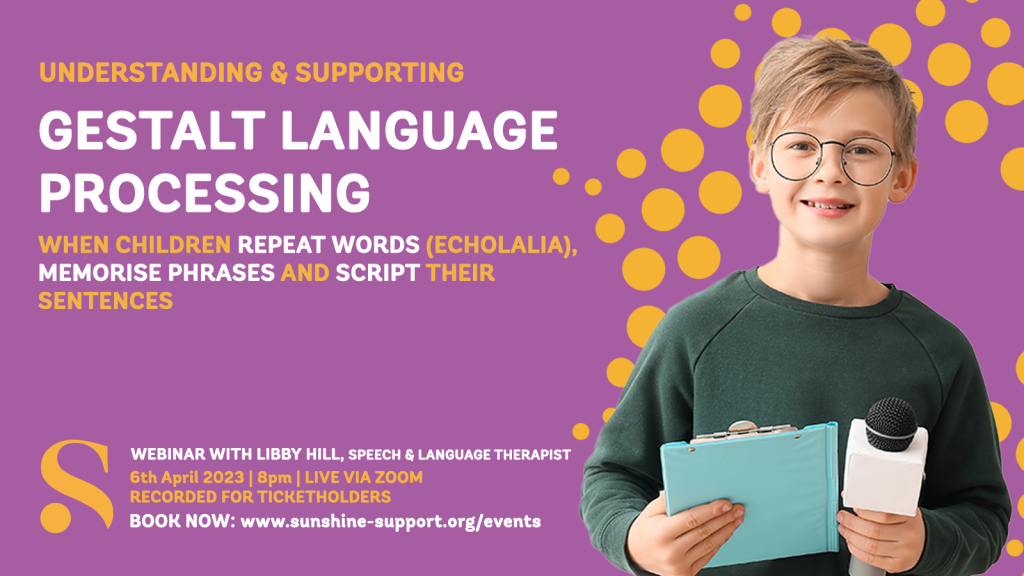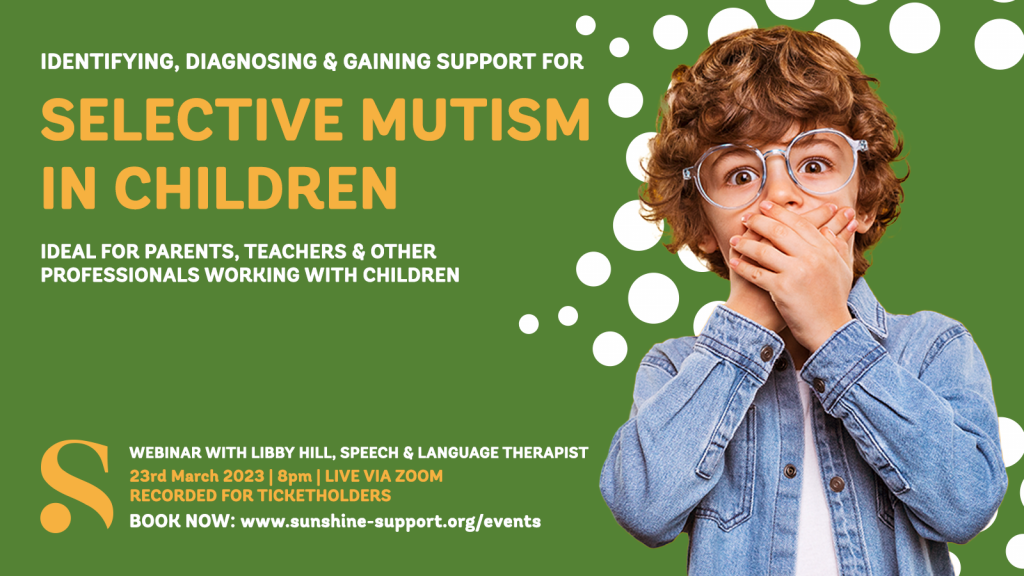Autism awareness isn’t enough. Here at Sunshine Support, we are striving for improved ACCEPTANCE this World Autism Awareness Week.

This week (March 29th – April 2nd) is Autism Awareness Week 2021, and here at Sunshine Support, we are on a mission to not only improve awareness of Autism but to also improve acceptance and acknowledgement of Autism.
As an organisation, we feel that although it is vital to improve the awareness of Autism, it is equally important to increase acceptance of Autism through sharing each other’s stories and addressing common misconceptions, to improve people’s Autistic journey.
We had a great response last year (watch our video here) but this year, we want to make it even more impactful!
We can’t do this alone though, it takes great effort from the community we are a part of.
HEARING YOUR VOICES
In the upcoming weeks to Autism Awareness Week 2021, we have been on a mission to hear your voices and opinions on the acceptance and awareness of Autism in society. We have listened to a range of people’s experiences and we hope this blog makes us one step closer to achieving our aim of developing the acceptance of Autism in society and to improve people’s Autistic journey.
So, what have we found?
We have had the privilege of hearing Corrina Wood’s, Linda’s and Rea Bank’s stories on their perceptions of Autism and first-hand experiences of the challenges faced with Autism. In particular, they have shared with us their encounters with:
- The misconceptions of emotional regulation.
- Functioning labels.
- Misconceptions of Autistic individuals who are men, women, ethnic minorities, transgender, bisexual or homosexual.
Corrina’s views…

Corrina has experience of managing and developing support services for families for over 15 years and has 4 children with Autism Spectrum Conditions. Meaning, she has first-hand experience of the challenges faced both personally and professionally.
Corrina spoke to us about misconceptions of Autism and how “Autism is not a look it is a style“. Corrina states “you cannot look Autistic as Autism looks different in everyone”. It is really important for us as a society to understand that sometimes there will be similarities in ‘style’ such as communication, interaction and thinking, but essentially how Autism ‘looks’ in someone is very dependent on the individual and cannot be categorised.
It is often that we find that individuals with ASD face difficulties with being generalised and compared to false stereotypes, which are not be applicable to their specific and indifferent journeys. Despite the general understanding in society that ‘Autism is a spectrum’, people still struggle to accept and be mindful of how EVERY autistic journey is different and the level of support an autistic individual may need can vary significantly.
To Corrina, Autism is “a new perspective, a different view and a refreshing approach” and beneath the neurodiversity is a person; a person who has the same basic needs as everyone else. A person who needs to be accepted for who they are.
Linda’s experience…

Linda shared her distressing experience with a paediatrician’s misuse of functioning labels on her daughter.
During a visit to the paediatricians, Linda felt stunned to hear that a professional told her if her daughter had “high functioning” Autism then it would not cause her problems, as opposed to if she had “low functioning” Autism. It became very apparent to Linda that the paediatrician was dismissing her daughter’s needs based off an observation of her on a ‘good’ day where the consultation room was large, spacious and had toys for her to play with (which would have acted as a stimulant for her mood at the time). Linda felt he did not 100% understand the extent of her daughter’s daily struggles, which she faced everyday. For example, behaviours such as “screaming and crying regularly” behind closed doors. As a result of her daughter’s needs being overlooked and categorised, using functioning labels, this left Linda feeling deprived of the appropriate care needed for her daughter and referral for assessment.
When speaking to the rest of the family about her visit to the paediatrician, Linda found that people closest to her also were not seeing the bigger picture as they too misunderstood how her daughter regulates her emotions, blaming Linda for her parenting techniques. This emphasises the importance of understanding Autistic individuals regulate emotions differently and what may seem like a ‘stereotypical Autistic trait’ may not apply to all Autistic individuals. Linda felt as though because her daughter did not fit into the stereotypes, she was not being taken seriously by professionals and even by her closest family members.
Fast forwarding to recent times, Linda was able to see the same paedication again. This second time around the appointment was in a completely different environment to the first session as it was “in a room which was small, cramped, too bright and with two other trainee doctors in the room”. Unfortunately, this heightened her daughter’s distress and anxiety levels, causing her to hide under the table. After having her daughter labelled as having “autistic traits” and being “high functioning” previously by the paediatrician, after seeing her daughter’s response to the new environment, the second time around, the same paediatrician was finally able to listen to Linda’s concerns and referred her daughter to five different specialists.
Linda’s story is just one example of a reoccurring problem faced in the Autistic community, where there is a wrongful use of functioning labels by professionals and individuals. Her story reiterates the harm behind using functioning labels on autistic individuals, who still need support with their complex needs, despite seeming “high functioning” off their first initial impressions.
Rea’s Journey…

Rea has had a diagnosis of ASD since the age of 2 years old and has taken this opportunity to help people to learn a new way of looking at emotions and behaviour.
Rea has faced difficulties with being unfairly judged and having inaccurate misconceptions of being a ‘naughty child’ growing up, due to her response when she felt her environment was interrupted by external factors. Rea has often felt misunderstood by society as from a young age, her tendency to freeze, scream or ‘lash out’ was as a result of her ASD but this was often labelled as misbehaving. Although from the outside façade, Rea may portray someone who is confident, loud, happy, funny and bold, often she is internally scared and worried of being judged in the wrong way and she struggles to manage her emotions when she is upset or dealing with a lot of stress. Like any individual with Autism, Rea processes information differently and to a person without Autism, this can appear that her emotions are ‘socially incorrect’, given the context of the situation. For example, Rea has often felt that in situations where she has received terrible news, such as the loss of a family member, instead of crying she likes to find distractions to minimise the intenseness of her feelings, which she struggles to manage.
Rea’s experiences with emotional regulation is an important reminder that we should not only acknowledge that we are all different and we experience situations differently; but also, that we display our emotions and behaviour differently when words aren’t enough. This is why “teaching acceptance and understanding these behaviours and to not judge someone for it”, carries such significance.
In terms of labels, Rea does not identify with being Autistic and would not usually mention her diagnosis when introducing herself to new people. She views her diagnosis as a label that explains how she learns, ways that she needs support and how she expresses her emotions, rather than it directly explaining who she is as a person. Rea feels that the Autistic label removes who she is as a person and overlooks the amazing things that she has achieved so far in her life. Therefore, she agrees that the use of low or high functioning labels lessens the achievements of others as it creates a barrier for Autistic individuals’ success and often feels like an insult to the individual.
Similarly, the rhetoric of ‘Autism only affects boys’, ‘you can’t be Autistic because you don’t look it’ or ‘but you make eye contact’ are deeply hurtful to individuals with ASD and saying things like this can dismiss their needs and uniqueness. Which is why it is important that we understand the importance of gaining an understanding of Autism to improve acceptance in society.
WHAT CAN WE DO AS A SOCIETY?

After reading Corrina’s, Linda’s and Rea’s stories, we can see real life examples where having a lack of acceptance and awareness of Autism, has caused people distress, anxiousness and eliminated the feeling of belonging in society. In this article we have only unpicked a small fraction of experiences with functioning labels, emotional regulation and misconceptions, and there are so many others who feel this way and have their own difficult experiences with this. Therefore, we must begin to be mindful of how we speak to others and listen to each others complex needs.
Think of autism in terms of connections – connecting not socialising, connecting the dots to make the whole picture, connecting their feelings to their behaviours, connecting with us – that may not be in a typical way – it may be just being in the same room.
We hope that you spend this Autism Awareness Week, being mindful, increasing your knowledge and acceptance of the diverse range of Autistic journeys.
Keep an eye out for updates everyday across our social media accounts (Twitter, LinkedIn, Instagram and Facebook) as we will be sharing insightful articles and resources to enhance your acceptance of Autism throughout this week.
To increase your knowledge further, keep yourself up to date with our weekly webinar events which cover all things SEND and join us in accomplishing our aims provide independent information, advice and support to parents/carers and professionals of children and young people with special educational needs.







